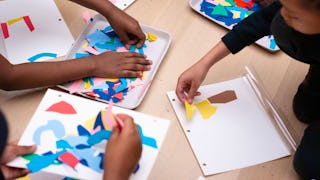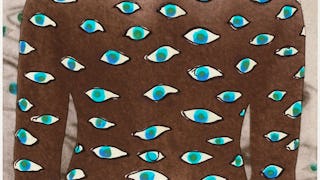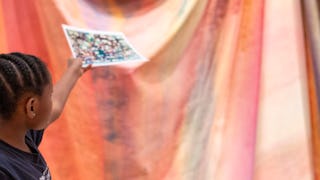Filter by
SubjectRequired
LanguageRequired
The language used throughout the course, in both instruction and assessments.
Learning ProductRequired
LevelRequired
DurationRequired
SkillsRequired
SubtitlesRequired
EducatorRequired
Explore the Watercolor Course Catalog

Wesleyan University
Skills you'll gain: Storytelling, Writing and Editing, Editing, Proofreading, Writing, Creativity

Michigan State University
Skills you'll gain: Photography, Peer Review, Photo/Video Production and Technology

The Museum of Modern Art
Skills you'll gain: Design Thinking, Creative Thinking, Learning Styles, Creativity, Learning Strategies, Empathy, Collaboration, Constructive Feedback
 Status: New
Status: NewThe Museum of Modern Art
Skills you'll gain: Compassion, Self-Awareness, Creativity, Personal Development, Empathy, Optimism, Mental Health, Mindfulness, Emotional Intelligence, Journals, Curiosity, Stress Management, Cultural Diversity

University of Colorado Boulder
Skills you'll gain: Graphic Design, Graphic and Visual Design, Graphic and Visual Design Software, Design, Visual Design, Typography, Adobe InDesign, Design Reviews, Adobe Photoshop, Design Elements And Principles, Peer Review, Color Theory, Editing, Creativity

The Museum of Modern Art
Skills you'll gain: Art History, Liberal Arts, Lesson Planning, Aesthetics, Social Studies, Teaching, Creativity, Student Engagement, Instructional Strategies, Curriculum Development, Student-Centred Learning, Cultural Diversity
 Status: New
Status: NewAdobe
Skills you'll gain: Photo Editing, Adobe Photoshop, Photography, Generative AI, File Management, Graphic and Visual Design, Creative Design, Editing, Creativity
 Status: Free
Status: FreeCalifornia Institute of the Arts
Skills you'll gain: Graphic Design, Graphic and Visual Design, Typography, Graphic and Visual Design Software, Adobe Creative Cloud, Visual Design, Design, Design Elements And Principles, Adobe Photoshop, Adobe Illustrator, Color Theory, Creativity

Michigan State University
Skills you'll gain: Photography, Photo Editing, Peer Review, Color Theory, Storytelling, Creativity, Information Privacy, Web Design and Development

Berklee
Skills you'll gain: Music, Media Production, Automation, Editing, Multimedia, Creativity

University of Colorado Boulder
Skills you'll gain: Logo Design, Color Theory, Color Matching, Graphic Design, Graphic and Visual Design, Design, Design Elements And Principles, Digital Design, Adobe Illustrator, Adobe Photoshop, File Management

Michigan State University
Skills you'll gain: Design Elements And Principles, Photography, Photo Editing, Graphic and Visual Design, Post-Production, Color Theory, Digital Design, File Management, Adobe Creative Cloud
In summary, here are 10 of our most popular watercolor courses
- Creative Writing: The Craft of Style: Wesleyan University
- Camera Control: Michigan State University
- Art & Activity: Interactive Strategies for Engaging with Art: The Museum of Modern Art
- Artful Practices for Well-Being: The Museum of Modern Art
- Graphic Design: University of Colorado Boulder
- Art & Ideas: Teaching with Themes: The Museum of Modern Art
- Image Editing: Adobe
- Основы графического дизайна: California Institute of the Arts
- Photography Techniques: Light, Content, and Sharing: Michigan State University
- FL Studio Basics: Berklee










